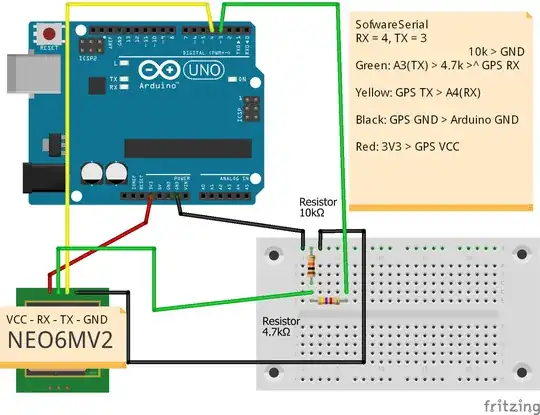I am doing a project using a NEO 6M GPS with my Arduino LilyPad. I programmed it already, and it's working well except of the speed. I get stuck on fixing this. I wonder why the value is never getting zero although I am not moving to my place.
I need any suggestions/help that would make the speed working accurately.
Thanks.
Here is the code I used:
#include <SoftwareSerial.h>
#include <TinyGPS.h>
SoftwareSerial mySerial(4, 3); // RX, TX
TinyGPS gps;
void gpsdump(TinyGPS &gps);
void printFloat(double f, int digits = 2);
void setup() {
// Open serial communications and wait for port to open:
Serial.begin(9600);
// set the data rate for the SoftwareSerial port
mySerial.begin(9600);
delay(1000);
Serial.print("Sizeof(gpsobject) = ");
Serial.println(sizeof(TinyGPS));
Serial.println();
}
void loop() {
bool newdata = false;
unsigned long start = millis();
// Every 5 seconds we print an update
while (millis() - start < 5000) {
if (mySerial.available()) {
char c = mySerial.read();
if (gps.encode(c)) {
newdata = true;
}
}
}
if (newdata) {
Serial.println("Acquired Data");
Serial.println("-------------");
gpsdump(gps);
Serial.println("-------------");
Serial.println();
}
}
void gpsdump(TinyGPS &gps) {
long lat, lon;
float flat, flon;
unsigned long age, date, time, chars;
int year;
byte month, day, hour, minute, second, hundredths;
unsigned short sentences, failed;
gps.get_position(&lat, &lon, &age);
Serial.print("Lat/Long(10^-5 deg): ");
Serial.print(lat);
Serial.print(", ");
Serial.print(lon);
Serial.print(" Fix age: ");
Serial.print(age);
Serial.println("ms.");
// On Arduino, GPS characters may be lost during lengthy Serial.print()
// On Teensy, Serial prints to USB, which has large output buffering and
// runs very fast, so it's not necessary to worry about missing 4800 baud GPS characters.
gps.f_get_position(&flat, &flon, &age);
Serial.print("Lat/Long(float): ");
printFloat(flat, 5);
Serial.print(", ");
printFloat(flon, 5);
Serial.print(" Fix age: ");
Serial.print(age);
Serial.println("ms.");
gps.get_datetime(&date, &time, &age);
Serial.print("Date(ddmmyy): ");
Serial.print(date);
Serial.print(" Time(hhmmsscc): ");
Serial.print(time);
Serial.print(" Fix age: ");
Serial.print(age);
Serial.println("ms.");
Serial.print("Alt(cm): ");
Serial.print(gps.altitude());
Serial.print(" Course(10^-2 deg): ");
Serial.print(gps.course());
Serial.print(" Speed(10^-2 knots): ");
Serial.println(gps.speed());
Serial.print("Alt(float): ");
printFloat(gps.f_altitude());
Serial.print(" Course(float): ");
printFloat(gps.f_course());
Serial.println();
Serial.print("Speed(knots): ");
printFloat(gps.f_speed_knots());
Serial.print(" (mph): ");
printFloat(gps.f_speed_mph());
Serial.print(" (mps): ");
printFloat(gps.f_speed_mps());
Serial.print(" (kmph): ");
printFloat(gps.f_speed_kmph());
Serial.println();
gps.stats(&chars, &sentences, &failed);
Serial.print("Stats: characters: ");
Serial.print(chars);
Serial.print(" sentences: ");
Serial.print(sentences);
Serial.print(" failed checksum: ");
Serial.println(failed);
}
void printFloat(double number, int digits) {
// Handle negative numbers
if (number < 0.0) {
Serial.print('-');
number = -number;
}
// Round correctly so that print(1.999, 2) prints as "2.00"
double rounding = 0.5;
for (uint8_t i=0; i<digits; ++i)
rounding /= 10.0;
number += rounding;
// Extract the integer part of the number and print it
unsigned long int_part = (unsigned long)number;
double remainder = number - (double)int_part;
Serial.print(int_part);
// Print the decimal point, but only if there are digits beyond
if (digits > 0)
Serial.print(".");
// Extract digits from the remainder one at a time
while (digits-- > 0) {
remainder *= 10.0;
int toPrint = int(remainder);
Serial.print(toPrint);
remainder -= toPrint;
}
}
NOTE: The altitude and longitude were already working. It's the speed that I want to fix. I want to see it as "ZERO SPEED" when at a steady state. How can I fix this? Please help me. Thanks!
